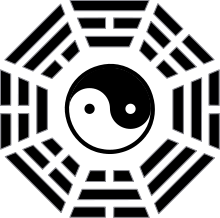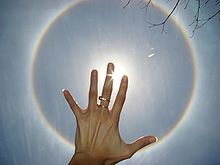Travels (book)
Appearance

Travels (1988) is a nonfiction book by Michael Crichton that details Crichton's attempts to leave his medical education at Harvard Medical School, followed by his subsequent travel to Los Angeles and adventures continuing his professional writing career. In the book, he describes his adventures over the world, and ultimately his experience with mysticism, including out-of-body experiences and fortune-telling.

Quotes
[edit]- I have included experiences in the realms that are sometimes called psychic, or transpersonal. or spiritual. I think of this as inner travel, to complement the outer travel, although that distinction — between what is internal sensation and what is external stimulus — often blurs in my mind.
- Preface
- The best doctors found a middle position where they were neither overwhelmed by their feelings nor estranged from them. That was the most difficult position of all, and the precise balance — neither too detached nor too caring — was something few learned.
- "Cadaver"
- The emotional aspect seemed more like hazing, like a professional initiation, than education. It was a long time before I understood that how a doctor behaved was at least important as what he knew.
- "Cadaver"
- We cause our diseases. We are directly responsible for any illness that happens to us.
- "Heart Attack!"
- To give up responsibility for our lives is not healthy.
- "Heart Attack!"
- The doctor is not a miracle worker who can magically save us but, rather, an expert adviser who can assist us in our own recovery.
- "Heart Attack!"
- The fact that the patients were complex human beings with a rich life beyond the hospital never really sank into the consciousness of the residents. Because they had no rich lives beyond the hospital, they assumed no one else did, either. In the end, what they lacked was not medical knowledge but ordinary life experience.
- "Quitting Medicine"
- What I knew was that the history of man demonstrated the inexorable triumph of reason over superstition, culminating in our acceptance of science as the best method for learning the truth and exploring the universe.
- "Psychiatry"
- I read all sorts of books there for the first time. The other thing that I did was, I began to travel again.
- "Psychiatry"
- The entire episode left me with a renewed respect for the power of the unconscious mind. What I had demonstrated, to myself at least, was that my ordinary assumption that in some casual and automatic way I know what I am doing, and why, is simply wrong.
- "Bonaire"
- I couldn't leave things alone. I was an urban, technological man accustomed to making things happen. I had been taught countless times that you were supposed to make things happen, that anything less implied shameful passivity.
- "Pahang"
- This increased my conviction that there was indeed something going on, that these people had some information source that ordinary people did not. I didn't know why they had access and the rest of us did not, but there didn't seem to be any hocus-pocus about it.
- "London Psychics"
- I was certain that some people, whether by accident of birth or some pecularity of training, could tune in to another source of information and could know things about people we didn't think were possible to know.
- "London Psychics"
- Sometimes I think man needs to feel a special position within nature, and this leads him to believe that he is either specially hated by other animals or specially cherished. Instead of the truth, which is that he's just another animal on the plain. A smart one, but just another animal.
- "Sharks"
Cactus Teachings
[edit]

- I was jealous. Let's face it, to have a mystical experience is a sign of favor from God. Everybody knows that. And I wasn't getting any favors. It really made me feel bad.
- If you stand beside a person who lies on his back, and move the palm of your hand slowly down the midline of his body about a foot above the skin, you will feel some distinct warm spots. These are the chakras.
- There isn't any delusion. It is absolutely clear that this body energy is a genuine phenomenon of some kind.
- The basic mechanism of the I Ching had to be the same as the mechanism of the tarot — to provide an ambiguous stimulus to the unconscious mind.
- The book can't tell you the answer. The book doesn't have that power. You do. You can answer your own question. You already know the answer, if you can just gain access to it.
- The purpose of the I Ching or the tarot, then, is to help you get access to yourself, by providing ambiguity for you to interpret. And this quality of ambiguity is shared with nearly all forms of divination — cast artifacts, or entrails, or weather formations, or events such as the flight of birds, that one could choose either to see as "omens" or to ignore.
The very thing that makes these divination techniques seem so unscientific is what makes it possible for them to work.
They
[edit]- By now I had adopted David's view of the inherent differences between the sexes, that men were the romantics and women were the pragmatists. His view was that each sex saw the other as a projection of itself.
- What's really wrong with making them the problem is that you abdicate your own responsibility. Once you say some mysterious they is in charge, then you're able to sit back comfortably and complain about how they are doing it.
- The biggest problem between the sexes was the tendency to objectify the opposite sex and ultimately become powerless before them. Both men and women did this about the opposite sex. They were this way or that way. They had this tendency. There was nothing we could do about the way they behaved.
- I had thought that women were inherently different from men. And in formulating that difference, I had also objectified women. They were different. They didn't have the same feelings I did. They were they.
Life on the Astral Plane
[edit]- Intermittent panicky skepticism was to be expected whenever you stepped off the cliff, whenever you went into some realm of experience that wasn't modeled and accepted and approved and stuck into a nice frame by society at large.
- The kind of evidence I have seen for clairvoyance or telepathy — evidence that leads me to accept these phenomena as unquestionably real — I have not experienced for the idea of past lives.
Spoon Bending
[edit]- Of course, spoon bending has been the focus of long-standing controversy. Uri Geller, an Israeli magician, who claims psychic powers, often bends spoons, but other magicians, such as James Randi, claim that spoon bending isn't a psychic phenomenon at all, just a trick.
But I had bent a spoon, and I knew it wasn't a trick. I looked around the room and saw little children, eight or nine years old, bending large metal bars. They weren't trying to trick anybody. They were just little kids having a good time. Staying up past their bedtimes on a Friday night, going along with the adults, doing this silly bending stuff.
- Spoon bending obviously must have some ordinary explanation, since a hundred people from all walks of life were doing it. And it was hard to feel any sort of mystery: you just rub the spoon for a while and pretty soon it gets soft, and it bends. And that's that.
The only thing I noticed is that spoon bending seemed to require a focused inattention. You had to try to get it to bend, and then you had to forget about it. Maybe talk to someone else while you rubbed the spoon. Or look around the room. Change your attention. That's when it was likely to bend.
- I don't know why spoons bend, but it seemed clear that almost anyone could do it.
- This seems to me to confirm the idea that so-called psychic or paranormal phenomena are misnamed. There's nothing abnormal about them. On the contrary, they're utterly normal. We've just forgotten we can do them. The minute we do do them, we recognize them for what they are and think, So what?
Seeing Auras
[edit]- When I got home, I looked at people to see if I could still see auras. I could. It's fun to do. When dinner parties get boring, you just look at people's auras.
Direct Experience
[edit]

- I had moved pretty far from the rational, academic, intellectual traditions in which I had been raised... So I decided to summarize the conclusions I had drawn from all these experiences.
- Consciousness has legitimate dimensions not yet guessed at.
- At least some psychic phenomena are real.
- There are energies associated with the human body that are not yet understood.
- It's only different from what a certain variety of incautious, unintrospective physical scientist believes.
- I hadn't traveled with the intention of learning about anything except myself. And the real point of all this travel was not what I had come to believe or disbelieve about the wider world, but what I had learned about myself.
- The natural world, the traditional source of self-interest, is increasingly absent.
- Cut off from direct experience, cut off from our own feelings and sometimes our own sensations, we are only too ready to adopt a viewpoint or perspective that is handed to us, and is not our own.
- Unaccustomed to direct experience, we can come to fear it.
- One of the most difficult features of direct experience is that it is unfiltered by any theories or expectations. It's hard to observe without imposing a theory to explain what we're seeing, but the trouble with theories, as Einstein said, is that they explain not only what is observed, but what can be observed. We start to build expectations based on our theories.
- It takes enormous effort to avoid all theories and just see.
- I believe the experiences reported in this book are reproducible by anyone who wishes to try.
- Be cautious around anyone who creates proselytizing followers.
Postscript
[edit]

- Reality is always greater — much greater — than what we know, than whatever we can say about it.
- Science is a kind of glorified tailoring enterprise, a method for taking measurements that describe something — reality — that may not be understood at all.
Science is very good as far as it goes. It has certainly produced powerful benefits. It would be crazy to abandon science, or to deny its validity.
But it would be equally crazy to think that reality is a forty-four long. Yet it seems as if that is what Western society has done. For hundreds of years, science has been so successful that the tailor has taken over our society. His knowledge seems so much more precise and powerful than the knowledge offered by other disciplines, such as history or psychology or art.
But in the end one can be left with a nagging sense of emptiness about the creations of science. One may even suspect that there is more to reality than measurements will ever reveal.
- One may even suspect that there is more to reality than measurements will ever reveal.
- Science can't tell you why anything happens.
- Although knowledge of how things work is sufficient to allow manipulation of nature, what humans really want to know is why things work. Children don't ask how the sky is blue. They ask why the sky is blue.

